
GETTING SATISFACTION? Alma Cuervo counsels Christina Pumariega on enjoying sex without sacrificing your virtue |
David Grimm's entertaining The Miracle at Naples, which the Huntington is premiering in a lively production by artistic director Peter DuBois at the Calderwood Pavilion (through May 9), is a commedia dell'arte–inspired sex farce about traveling players — form equals content — who land in Naples in the autumn of 1580 at the time of the annual miracle of San Gennaro. Social activity stops dead until the saint's blood liquefies in the local church named for him. The lives of the small, rag-taggle band of actors and the locals they encounter — a motherless young woman named Flaminia (Christina Pumariega) and her duenna, Francescina (Alma Cuervo) — also come to a standstill while the characters strive to disentangle themselves from a mire of erotic confusions. Francescina renews her acquaintance with the troupe's leader, Don Bertolino (Dick Latessa), while her charge cavorts with his nephew Tristano (Pedro Pascal) and Tristano's pal Matteo (Gregory Wooddell). But then Flaminia falls for the leading man, Giancarlo (Alfredo Narciso), who has been toying with Don Bertolino's daughter La Piccola (Lucy DeVito).
In truth, commedia, the Italian improvisational comedy most familiar to contemporary audiences through the characters in Molière's plays, is a more prescribed form than Grimm's modern-day variant, as we see when the players perform their piece in the second act. (This overstated interlude is deadly; it stops the play in its tracks for a quarter of an hour.) Grimm, like Molière, uses ideas from commedia as a jumping-off point for his own themes, which have a distinctly 21st-century bent. The duenna counsels Flaminia that she can satisfy her sexual appetite while officially retaining her virtue by allowing a suitor to sodomize her. When she gives rein to her lust with the two randy young actors, though, Giancarlo is outraged; it doesn't occur to him to apply the same sexual standard to his own conduct with La Piccola. Meanwhile, Matteo and Tristano, under the influence of a bogus love potion that really just makes them drunk, wind up in bed and discover they're in love, but in the light of day Tristano's social consciousness and Catholic shame oblige him to deny it.
Projecting modern-day concerns onto a comedy with a period setting is tricky, but when it works it can be ticklish and satisfying (as it is in Jeffrey Hatcher's Stage Beauty, which is about the introduction of women on the stage during the Restoration). Grimm could manage it better if he kept himself from taking a sermonizing tone when the young men quarrel in the wake of their discovery that they're gay and when Flaminia and La Piccola point out the hypocrisy of Giancarlo's tirade against his beloved's sexual experience. Grimm's self-righteousness flattens out the play, which is often genuinely witty. And he's self-conscious in his use of bawdy humor. The characters crack filthy jokes, which are hilarious at best. But Grimm labors under the misperception that obscenity is automatically funny, and after the first few times you've heard each of the characters curse, the comic shock wears off.